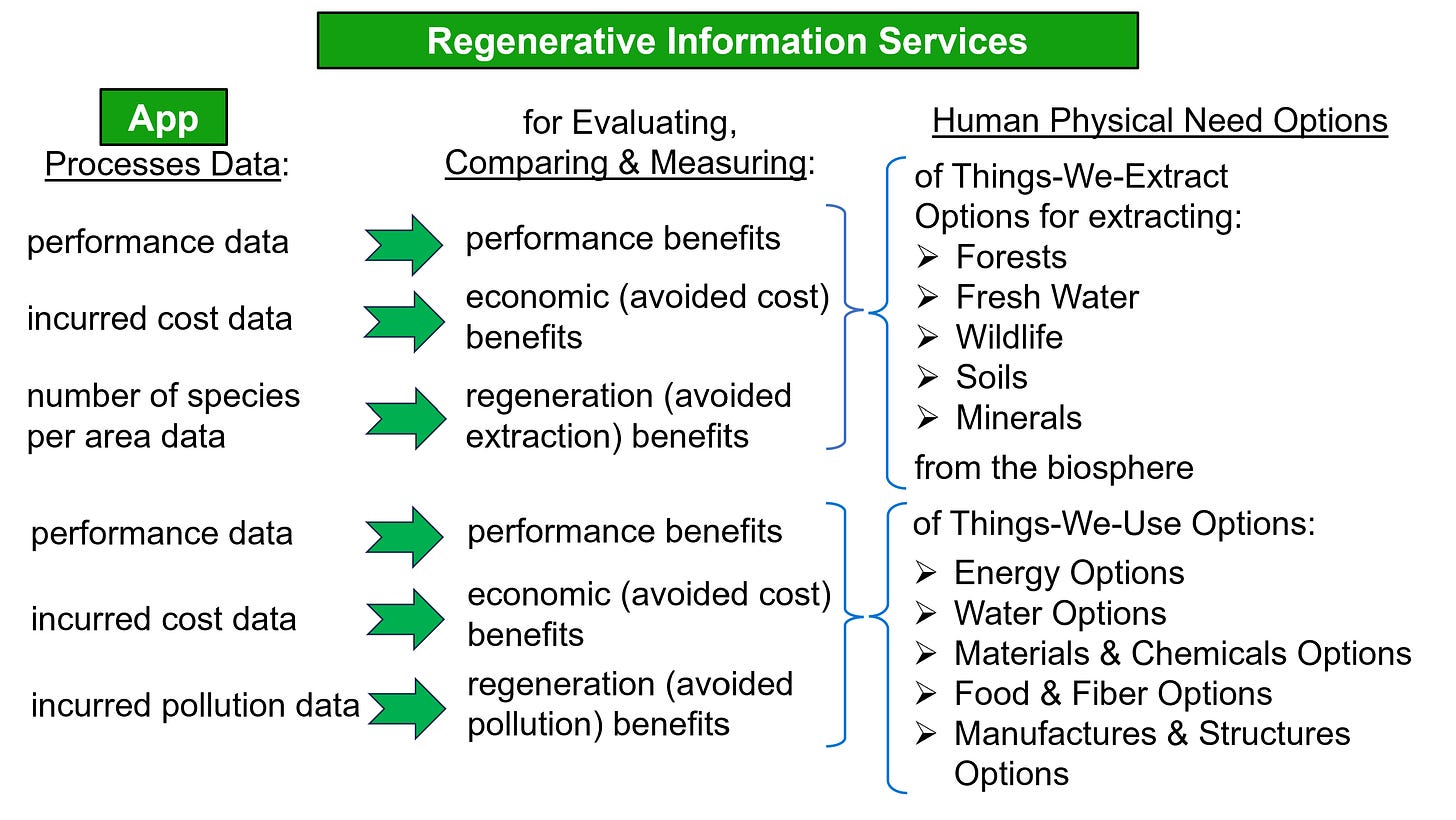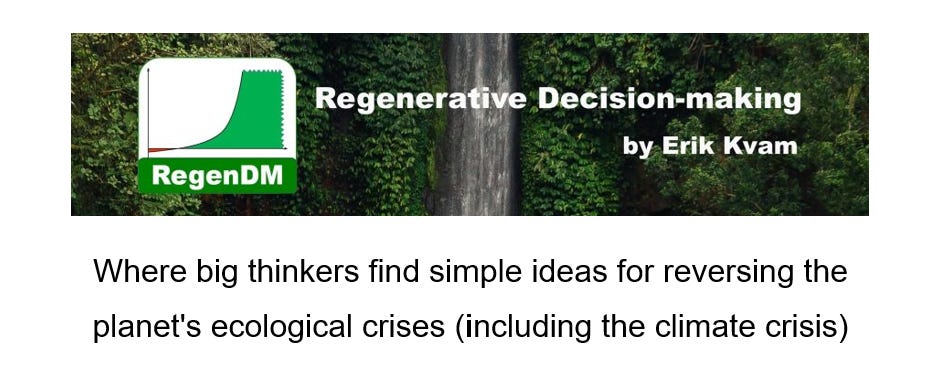The Regenerative Entrepreneur: Extremely Simple Regenerative Decision-making Creates Extraordinary Career Opportunities
Part 4 of the “Extremely Simple” Series
Disruptive innovations create jobs. – Clayton Christensen
What if reversing the planet’s ecological crises as a whole (including the climate crisis) is a solvable problem?
What if reversing the planet’s ecological crises as a whole (including the climate crisis) is a practical and achievable goal?
In 10x Is Easier Than 2x, strategic coaches Dan Sullivan and Benjamin Hardy reveal the practicality of seemingly impossible goals:
Seemingly impossible or massive goals are highly practical because they immediately separate what works from what won’t, illuminating the few paths that have the greatest efficacy. …
Seemingly impossible goals are more practical than possible goals because impossible goals force you outside your current level of knowledge and assumptions. …
Reversing the planet’s ecological crises as a whole is a seemingly-impossible-but-practical goal because:
it forces one outside one’s current level of knowledge and assumptions about the problem, and
it forces one into an extreme simplification of the problem that illuminates the few paths (or processes) for solving the problem.
Steve Jobs said:
“Simple can be harder than complex: You have to work hard to get your thinking clean to make it simple. But it’s worth it in the end because once you get there, you can move mountains.”
My simple book, We Can Reverse the Planet’s Eco-crises, solves the problem of reversing the planet’s eco-crises as a whole (including the climate crisis) through:
1) extremely simplifying the problem of the planet’s eco-crises – in the form of an extremely simple mapping of the decision-making system for meeting human physical needs (called “the Human Enterprise”) that’s creating the planet’s eco-crises as a whole …
2) … using that mapping to design a process for solving the problem – in the form of an extremely simple decision-making process (called “regenerative decision-making”) – usable by people everywhere – for adopting “regenerative options” that scale back the extraction flows and pollution flows of the Human Enterprise …
3) … and using that regenerative decision-making process within an extremely simple Observe – Orient – Decide - Act (OODA) loop (called a “regenerative OODA loop”) – usable by people everywhere -- for adopting regenerative options at the exponential rate needed for reversing the planet’s ecological crises …
In Part 3 of this series, you learned how reversing the planet’s ecological crises might look like entrepreneurs investing $9.70 billion in a regenerative database & app for delivering an extreme 100x upside in the form of $970 billion of regenerative information services …
… and might look like entrepreneurs providing $970 billion of regenerative information services for delivering an extreme 100x upside in the form of $97 trillion of avoided cost savings and 1 trillion tons of avoided carbon pollution …
Delivering those avoided costs savings on a scale of $97 trillion – and creating a regenerative information services industry on a scale of $970 billion – will require people (like you) who commit themselves to:
understanding the decision-making system for meeting human physical needs (the Human Enterprise) that’s creating the planet’s eco-crises,
working with people everywhere to design and use regenerative decision-making processes:
for identifying options for meeting human physical needs
for evaluating the performance benefits, economic (avoided cost) benefits, and regeneration (avoided extraction & avoided pollution) benefits of those options
for comparing those benefits, and
for persuading themselves what option(s) they want to adopt and deciding to adopt them, and
working with people everywhere to design and use regenerative OODA loops:
for exponentially faster decision-making
for adopting exponentially more regenerative options
for delivering exponentially more regeneration benefits
working with similarly committed people to design, build and use computer-implemented applications (“apps”) and databases for delivering “regenerative information services” in the form of:
accurate evaluations, comparisons and measurements
of performance benefits, economic benefits and regeneration benefits
of Things-We-Extract options and Things-We-Use options for meeting human physical needs …
Delivering those avoided costs savings on a scale of $97 trillion – and creating a regenerative information services industry on a scale of $970 billion – will require people (like you) with training, skills and experience in the following disciplines:
Ecology
Applying ecological science – specifically, the ecology of human beings’ relationship with the biosphere – for understanding the decision-making system (the Human Enterprise) that’s creating the planet’s eco-crises
Physical Sciences
Designing, building and using apps and units-of-physical-performance databases for evaluating performance benefits of Things-We-Extract options and Things-We-Use options for meeting human physical needs
Designing, building and using apps and incurred-pollution-per-unit-of-physical-performance databases for evaluating regeneration (avoided pollution) benefits of Things-We-Use options for meeting human physical needs
Natural Sciences
Designing, building and using apps and number-of-species-per-area databases for evaluating regeneration (avoided extraction) benefits of Things-We-Extract options for meeting human physical needs
Cost Accounting
Designing, building and using apps and incurred-cost-per-unit-of-physical-performance databases for evaluating economic (avoided cost) benefits of Things-We-Extract options and Things-We-Use options for meeting human physical needs
Information Sciences
Designing, building and using apps and databases for evaluating performance benefits, economic benefits and regeneration benefits of Things-We-Extract options and Things-We-Use options for meeting human physical needs
Psychology
Applying psychological science – specifically the cognitive psychology of human decision-making and human decision-making processes – for designing and using regenerative decision-making processes and regenerative OODA loops
Regenerative Design
Using regenerative information services to design regenerative options that deliver more performance benefits, more economic benefits and more regeneration benefits (regenerative option designer)
Designing regenerative decision-making processes and regenerative OODA loops tailored to fit the specific needs of decision-makers (regenerative OODA loop designer)
Designing regenerative planning processes for delivering more benefits from decision-makers’ sequential adoption of regenerative options (regenerative planning process designer)
Designing regenerative procurement processes for ensuring delivery of expected benefits from regenerative options (regenerative procurement process designer)
Regenerative Information Services Enterprise
Performing the business functions of a large enterprise for delivering regenerative information services, including:
governance and administration
marketing and sales
finance and accounting
customer services
human resources
enterprise information systems
research and development
communications and public relations
investor relations
Entrepreneurs investing $9.70 billion in a regenerative database & app (for delivering $970 billion of regenerative information services) might look like tens of thousands of extraordinary career opportunities in the nascent regenerative information services industry.
Steve Jobs might have put it this way:
Simple can be harder than complex: You have to work hard to get your thinking clean [to design a simple decision-making process for reversing the planet’s eco-crises, and to engage tens of thousands of professionals in designing, building & using a simple app & database allowing people everywhere to use that simple decision-making process for winning trillions of extreme upsides]. But it’s worth it in the end because once you get there, you can move mountains [and reverse the planet’s eco-crises as a whole].
I’m super grateful for your likes, replies and shares.
Thank you for reading and aloha!
P.S. I cross-posted this article on Medium to give it greater reach.










